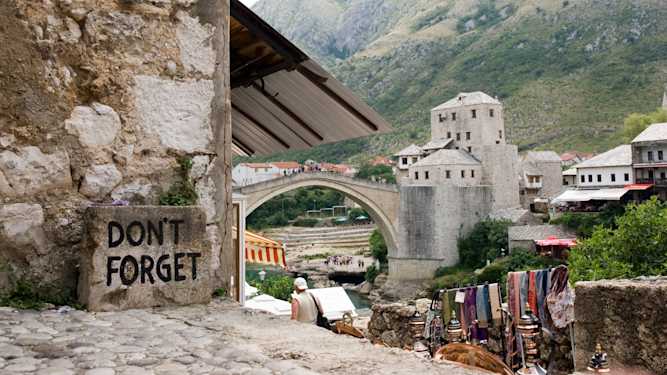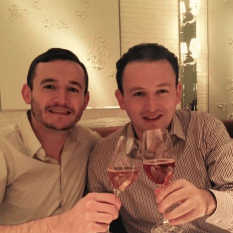
Bosnia 2025 - February
Throughout 2025, Ian Bancroft is collecting reflections on Bosnia-Herzegovina thirty years on from the end of the war. These reflections, supplemented by other insights and stories, explore various dimensions (peacebuilding, reconciliation, culture, education, politics), while reflecting on the past and the future.
To contribute your reflections on Bosnia-Herzegovina, please click here.
One can gauge much about the state of the world by the extent of arms purchases. Russia’s invasion of Ukraine has made countries reassess their weapons capabilities and stockpiles. It is a boon for Bosnia-Herzegovina. In 2024, the country’s exports of military products exceeded half a billion KM for the first time, growing 37.5% in just one year. Given the country’s dire economic situation, any source of growth is greatly appreciated.
A friend says, ‘I am a bit tired from history and politics, as well as from all my engagements’. ‘Bosnia-Herzegovina has a lot of positive elements’, they continue, adding that ‘probably one should stop analysing it, since it exists for centuries and shall continue in spite of all the analyses and opinions.’
They are words that reflect the feelings of many people throughout Bosnia-Herzegovina, who have endured almost endless speculation about the ultimate demise of their country. Nearly every year there is a newspaper headline or op-ed about how the country is on the brink of war; that they face a repeat of the horrors that they endured over thirty years before.
The negative commentaries vastly outnumber the good stories that could be told, especially concerning international coverage. When positive stories are told - for instance, about relations between people from different communities - they are typically presented as rare exceptions, not reflections of daily life.
People are tired. They are tired of the repetitive focus on politics, nationalism, identity, and other such factors that only ever serve Bosnia-Herzegovina ill. They are tired of the repurposing of history to serve contemporary policies. They are tired of their lives being overly determined by domestic politicians and international officials. They’d like to talk about something else, yet they can’t.
A Facebook memory from seven years ago is a photograph of a box of Tuzlanska Sol (Tuzla Salt), which has two expiration dates - three years in Federation and two years in Republika Srpska. ‘Bosnia-Herzegovina summed up in one photograph’, was my comment, to which one friend enquired ‘what about Brčko District?’. It is not the only packaging absurdity in the country. Pick up any box of cigarettes and the warning that smoking kills is written three times - the Bosnian and Croatian versions are identical, whilst the Serbian version is written in Cyrillic.
Another contributor writes, ‘sadly, as Yugoslavia didn’t have a chance to survive, Bosnia doesn’t either. You can’t force people to live together if they don’t want to. Sooner it splits, [the] sooner the agony will be over.’ It is concise, profound, and bleak; infused with a heavy sense of resignation, of hopelessness.
It is not a voice from Republika Srpska keen for the entity to secede and asserting it is futile to try to keep Bosnia-Herzegovina together. It is a voice from the Federation that has simply endured too much despair about the country’s prospects. After thirty years, some are ready to give up.
It reminds me of a quote, apparently formulated by the Partisans during World War Two, that ‘without Bosnia there is no Yugoslavia and without Yugoslavia there is no Bosnia’. Yugoslavia is, of course, no more, but yet Bosnia-Herzegovina endures.
After publishing some initial reflections from January, including about the country's education system, I am duly informed that Switzerland, another country of Cantons, also doesn't have a state-level Ministry of Education. Bosnia-Herzegovina is not as unique as I thought it was.
Harun Šabanović, from Brčko District, believes that ‘we have made a big step forward since we have preserved peace in Bosnia-Herzegovina’, and that ‘we enjoy freedom of expression of culture, religion and other spheres of life’. It is a considered and positive sentiment. ‘There is much ahead of us that we have not yet done and that is necessary to make life even better’, he reflects.
‘I believe that we are moving in the right direction towards the European Union where we belong’, he adds, acknowledging the political and socio-economic challenges. In youth he trusts, describing them as ‘the drivers of positive changes’; capable of providing the ‘quality and decisive leaders’ that he thinks the country needs. ‘I place a lot of hope in young people who are slowly but surely taking over the leadership of social processes’, Harun concludes.
To contribute your reflections on Bosnia-Herzegovina, please click here.
You can also contact Ian directly by clicking here.
Ian is a writer based in the Balkans. He is the author of 'Dragon's Teeth - Tales from North Kosovo' and 'Luka'. Follow Ian on Twitter @bancroftian.
Currently in: Belgrade, Serbia — @bancroftian
